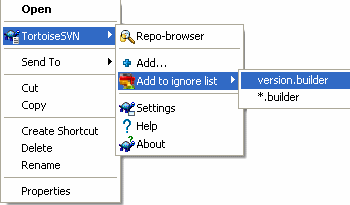In most projects you will have files and folders that should not be subject
to version control. These might include files created by the compiler,
*.obj, *.lst, maybe an output folder used to store
the executable. Whenever you commit changes, TortoiseSVN shows your unversioned
files, which fills up the file list in the commit dialog. Of course you
can turn off this display, but then you might forget to add a new source
file.
The best way to avoid these problems is to add the derived files to the project's ignore list. That way they will never show up in the commit dialog, but genuine unversioned source files will still be flagged up.
If you right click on a single unversioned file, and select the command → from the context menu, a submenu appears allowing you to select just that file, or all files with the same extension. If you select multiple files, there is no submenu and you can only add those specific files/folders.
If you want to remove one or more items from the ignore list,
right click on those items and select
→
You can also access a folder's svn:ignore
property directly. That allows you to specify more general
patterns using filename globbing, described in the section below.
Read the section called “Project Settings” for more information
on setting properties directly. Please be aware that each ignore pattern
has to be placed on a separate line. Separating them by spaces does not work.
The Global Ignore List
Another way to ignore files is to add them to the
global ignore list. The big difference here
is that the global ignore list is a client property.
It applies to all Subversion projects, but on
the client PC only. In general it is better to use the
svn:ignore property where possible, because it
can be applied to specific project areas, and it works for
everyone who checks out the project. Read
the section called “General Settings” for more information.
Ignoring Versioned Items
Versioned files and folders can never be ignored - that's a feature of Subversion. If you versioned a file by mistake, read the section called “Ignore files which are already versioned” for instructions on how to “unversion” it.
Subversion's ignore patterns make use of filename globbing, a technique originally used in Unix to specify files using meta-characters as wildcards. The following characters have special meaning:
- *
Matches any string of characters, including the empty string (no characters).
- ?
Matches any single character.
- [...]
Matches any one of the characters enclosed in the square brackets. Within the brackets, a pair of characters separated by “-” matches any character lexically between the two. For example
[AGm-p]matches any one ofA,G,m,n,oorp.
Subversion uses the / as the path delimiter in all
internal pathnames, and all pattern matching is done against this style of
path names. If you want to use a path delimiter in your ignore pattern,
be sure to use /, and not the Windows backslash.
Pattern matching is case sensitive, which can cause problems
on Windows. You can force case insensitivity the hard way
by pairing characters, eg. to ignore *.tmp
regardless of case, you could use a pattern like
*.[Tt][Mm][Pp].
Subversion uses this pattern matching against every path presented to it for action. These paths are generally relative to the directory being acted upon for import, add, commit, etc. The matching pattern therefore has to take account of the fact that there may or may not be path components before the filename.
If directory names are present in a path, the matching algorithm will
not trim them off, so pattern Fred.* will match
Fred.c but not subdir/Fred.c.
This is significant if you add a folder which contains some files
that you want to be ignored, because those filenames will be
preceded with the folder name when Subversion compares them with
the ignore pattern.
The / character is not treated in any special way
for pattern matching purposes, so the pattern abc*xyz
would match abcdxyz but also
abcdir/subdir/anything/morexyz.
To ignore all CVS folders you should either
specify a pattern of *CVS or better, the pair
CVS */CVS. The first option works, but would
also exclude something called ThisIsNotCVS.
Using */CVS alone will not work on an
immediate child CVS folder, and
CVS alone will not work on sub-folders.
If you want an official definition for globbing, you can find it in the IEEE specifications for the shell command language Pattern Matching Notation .
